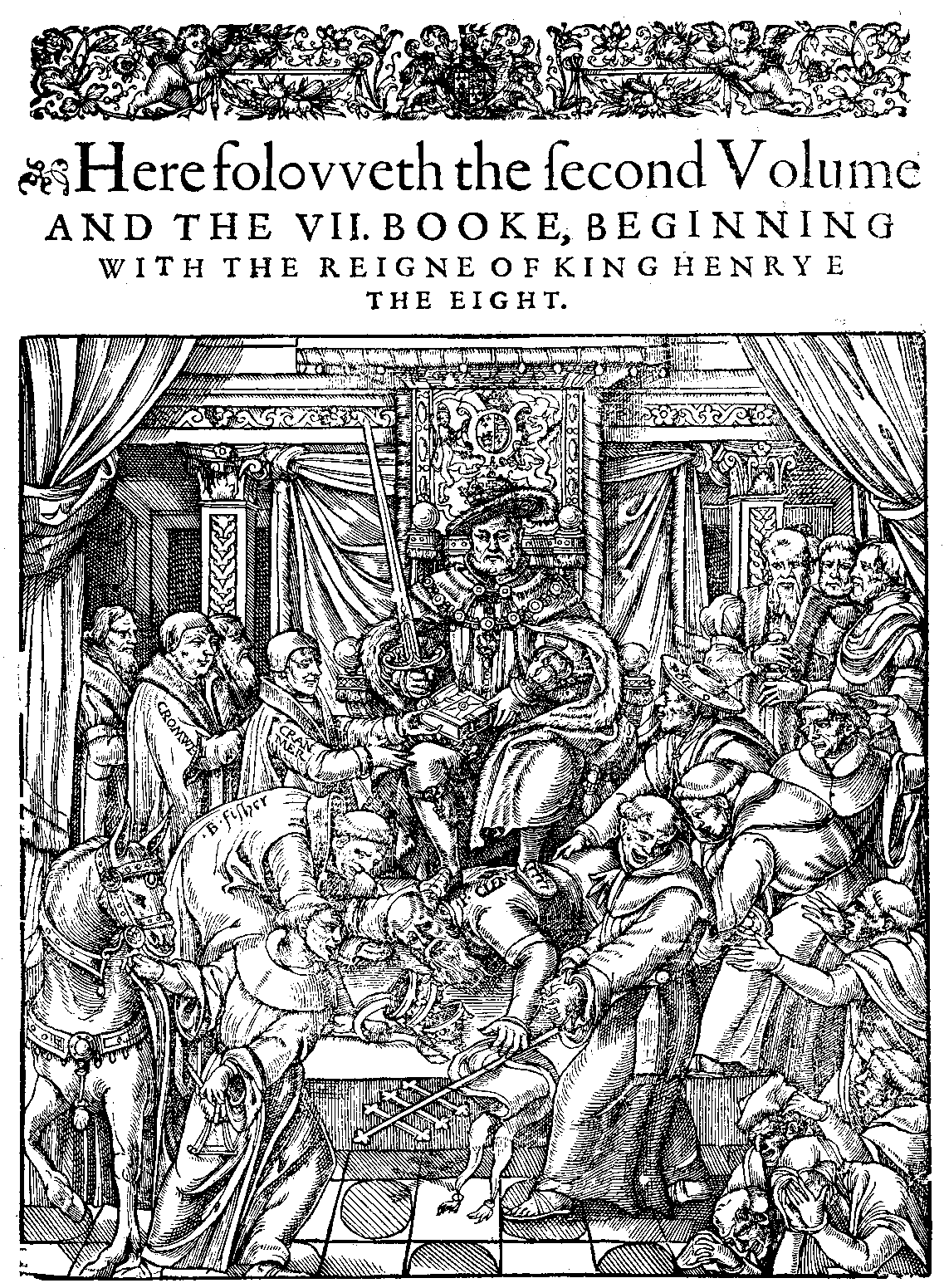Here foloweth the seconde volume and the seuenth booke, beginnyng with the reigne of king Henry the eyght.
 [View a larger version]
[View a larger version]
Commentary on the Woodcuts

The fresh format and illustrative input of the 1570 edition included grand new woodcuts to mark important phases of the remodelled text. Important among these was the image of Henry VIII triumphing over the pope. Regal assurance and papal dismay are here affirmed in full. The king himself, enthroned in state, central and corporeally impressive, presides over the collapsing and confused posse of papal supporters who are doing their best to rescue the falling Pope Clement who has become the royal footstool. The calm that prevails above, as Archbishop Cranmer, supported by Cromwell, receives the Bible at the king's hands, is matched by the confusion below of Bishop Fisher and the cardinal and frenzied friars who cling onto their triple cross as the papal mitre falls apart, and a hasty getaway on the caparisoned horse remains the only hope. Despair (witness the group bottom right) is all that remains for papal pomp and presence. The king himself, authorised by and authorising the book of scripture, seated in state on his high throne like another Solomon (to whom Chancellor Audley likened him in parliament in June 1536), was to be seen as the image of justice. In 1570 and 1576, this woodcut was used to illustrate the events of 1534 which it portrayed. But in 1583 it was given a more declaratory position, marking the opening of Book VIII on the reign of Henry VIII at the start of the second volume. The expulsion of the pope becomes the key to the achievements of this reign, and the religious revolution is announced at its start. WREN copy: note that gold detail is provided in this copy (but not in CUL); for example, the sword, book spine, arms (which include blue), and horse's bridle are all detailed in gold.
Marginalia1509 A S touching the ciuile state & administration
Commentary

Henry VII's reign
This brief section is all that Foxe devotes to the political history ofHenry VII's reign, and of the early reign of Henry VIII. Those aspects of this periodthat Foxe does briefly discuss fall under four headings: 1) an oblique attack on papal claims to jurisdiction over secular rulers, 2) an overt attack on the military campaignsof the Renaissance papacy, 3) stories of providential punishment on those who perse-cuted God's saints and 4) a summary of early Tudor dynastic history, particularly themarriage of Henry VIII to Katherine of Aragon, which is necessary background for later developments.
[Back to Top]Foxe's sources for this section were all printed: Fabyan's chronicle, George Lily's chronicle and Bale's Catalogus. What is striking, however, is that is clear thatFoxe was led to examine Lily's chronicle by Bale's citations of it (Bale, Catalogus, p.643, p.644 and p.645). Fabyan was used to supply corroborative detail; here, as in so many places, Foxe was drawing his basic interpretation of events from Bale.
[Back to Top]Thomas S. Freeman
University of Sheffield
of the common wealth, and likewise of the state of the Church, vnder the reigne of kyng Henry. vii. how he entred first in possession of the crown: howe the two houses of Yorke and Lancaster were in hym conioyned through mariage with Elizabeth the eldest daughter to K. Edward 4. by the prudent co?saile of Iohn Morton then B. of Ely, after Arch
MarginaliaNotes summarely collected and repeted of things done in the tyme of K. Henry the seuenth bishop of Canterbury, and Cardinall: howe long the sayd king reigned, and what persecution was in his tyme for lacke of searche and knowledge of Gods worde, both in the dioces of Lincolne vnder Bishop Smyth (who was erector of the house of Brasen nose in Oxford) as also in the dioces of Couentrie, and other places moe: and further what punishment and alteration commonly God sendeth vpon cities and realmes publique for neglecting the safetie of his flocke, sufficiently in the former booke hath bene already specified. Wherein many thinges more amplly might
[Back to Top] haue
AAa.i.


 1576 Edition | Book 7 | Page 797
1576 Edition | Book 7 | Page 797 